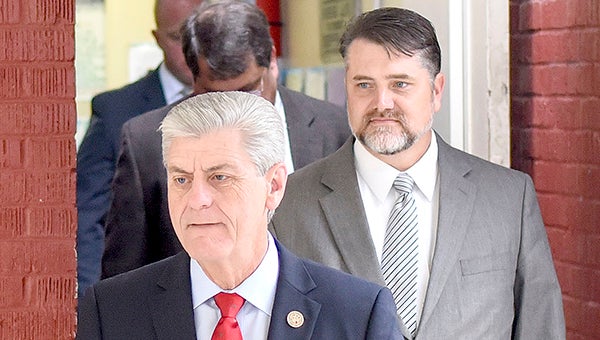VWSD, Shealy honored in state address
Published 9:39 am Thursday, January 19, 2017

- Governor Phil Bryant is led on a tour throughout the Academy of Innovation on Tuesday Morning. The Governor toured the Academy of Innovation, Career and Technical Early College and Warren Central High School to view the non-traditional techniques of teaching.
The Vicksburg Warren School District received high praise Tuesday.
In his State of the State address, Mississippi Gov. Phil Bryant referenced the strides the local school district and superintendent Chad Shealy have taken to advance students in the workforce through science, technology, engineering and math education.
“It was two-fold,” Shealy said. “One, I swelled with pride knowing our school district was receiving some of the notoriety, or support, they deserve, and of course for Vicksburg.”
He said the recognition was really for the entire city and not just the schools because for a school district to succeed, it takes community support.
“There are a lot of people that are involved as partners with our school district now. We have industry partners, business owners, local community members and all of them put so much work, time, energy and effort towards the shared vision and goals we’re putting forth,” he said. “For the governor to recognize that and give us such a substantial amount of time in his speech, it was wonderful. It was very humbling. It was great to be able to represent all of Vicksburg.”
Shealy said about two weeks ago he was asked to be a special guest at the governor’s address, but he had no idea his name or the school district would be mentioned in Bryant’s speech.
“I was completely unaware that that was going to happen — that they were going to recognize us like that,” Shealy said. “He actually used our motto, ‘All education leads to employment.’”
The two spent time together in December when Bryant toured three of the local schools. Mayor George Flaggs Jr. had told Bryant of the innovation programs the district had been implementing in the curriculum, and Bryant said he needed to come see it for himself.
“The STEM Program at the Academy (of Innovation) is intentionally designed to provide personal relevance,” Bryant said in his address. “It is educational innovation and individual student opportunity that is being forged in the Vicksburg-Warren School District. Such innovation will bring about the real-world improvement in career and college readiness so desperately needed across our state.”
In July, Bryant will become the chairman of the Education Commission of the States, a non-partisan, non-profit education policy research center. Bryant will use what he learned in Vicksburg with the organization, other school districts and when speaking to the president in the coming days after the inauguration.
Shealy said what makes the Vicksburg Warren School District special is the people. It is the teachers, students and parents, he said, who have worked together to make a change in the district by reaching out to the community. It’s something he has never seen before on this level.
“I think any location is only as good as the people that are in it,” he said. “I think our best assets are our teachers, our students and our parents. We just have a remarkable community. I’m going to be honest with you, the strength of the school district is the synergy of including people, and giving voice to what the community really wants…We truly are better when we’re together.”
He said he is willing to try new things when it comes to innovating the district, and the school board supports him in those risks, which is why the district stands out from the rest.
“Sometimes it is difficult to take those risks and step out on to new ground when it’s unknown,” Shealy said. “My school board is remarkable. We have a shared vision, and they’ve supported those risky steps.”
Education funding has been a top topic in the current state legislative session. Recommendations by EdBuild, an education-consulting group, to spend more on struggling districts and less on affluent districts was presented to the joint House and Senate Education and Appropriations committees Monday.
Potentially, the local school district could receive more funding. Shealy said he is interested to see how recommendations by EdBuild on the school funding formula would pan out in legislation.
“I’m very anxious to see how those recommendations are taken and really come out of the Legislative session. Ultimately they are just making recommendations. They are not changing policy,” Shealy said.
However, he did note he liked the attention EdBuild gave to poverty, special education and student transportation when it came to their recommendations.
“I think it’s great they’re understanding urban poverty is different than rural poverty, and poverty is the biggest hurtle to success in the state,” he said.





